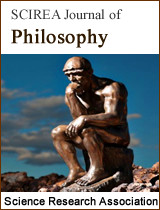How to Derive Other Valid Generalized Syllogisms from the Generalized Syllogism MAI-4
DOI: 10.54647/philosophy720099 21 Downloads 13718 Views
Author(s)
Abstract
This paper first formalizes categorical propositions in syllogisms, then proves the validity of the generalized syllogism MAI-4, and then deduces other 15 valid generalized syllogisms from the syllogism MAI-4. In other words, there are reducible relationships between/among the 16 syllogisms. This study highlights the dialectical materialist idea that things are universally interconnected. This study not only provides inspiration for studying generalized syllogisms with other generalized quantifiers but also provides a research perspective for knowledge representation and knowledge reasoning.
Keywords
generalized quantifiers; generalized syllogisms; validity; reducible relationship
Cite this paper
Zhaolong Yuan, Cheng Zhang,
How to Derive Other Valid Generalized Syllogisms from the Generalized Syllogism MAI-4
, SCIREA Journal of Philosophy.
Volume 4, Issue 3, June 2024 | PP. 62-69.
10.54647/philosophy720099
References
| [ 1 ] | Westerståhl, D. (2008). Decomposing generalized quantifiers, Journal of Symbolic Logic, 1(3): 355-371. |
| [ 2 ] | Hao, L. H. (2024). Knowledge reasoning based on the generalized syllogism AHH-2, SCIREA Journal of Computer, 9(1): 1-8. |
| [ 3 ] | Wang, H. P. and Yuan, J. J. (2024). The reducibility of the generalized syllogism MMI-4 with the quantifiers in Square{most} and Square{some}, SCIREA Journal of Mathematics, 9(4): 84-92. |
| [ 4 ] | Wu, B. X. (2024). Knowledge mining based on the valid generalized syllogism MMI-3 with the quantifier ‘most’, SCIREA Journal of Information Science, 8(2): 84-94. |
| [ 5 ] | Peters, S. and Westerståhl, D. (2006). Quantifiers in Language and Logic. Oxford: Claredon Press. |
| [ 6 ] | Hamilton, A. G. (1978). Logic for Mathematicians. Cambridge: Cambridge University Press. |
| [ 7 ] | Cao, Q. and Li, H. (2024). The reducible relations between/among valid generalized syllogisms with the generalized quantifiers in Square{most}, SCIREA Journal of Philosophy, 4(2): 34-42. |

